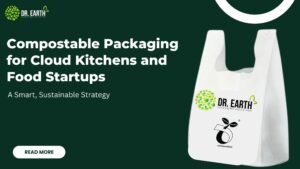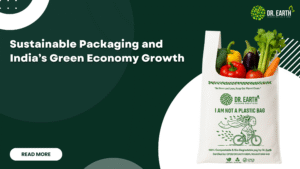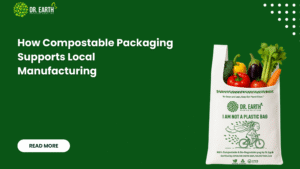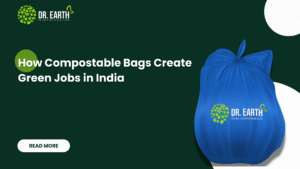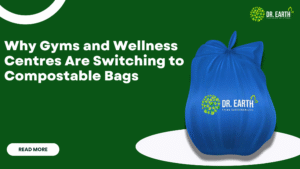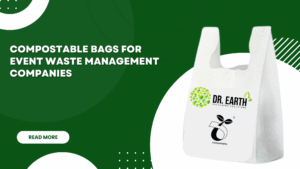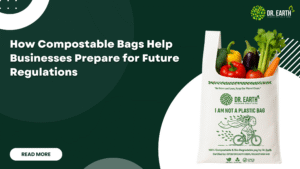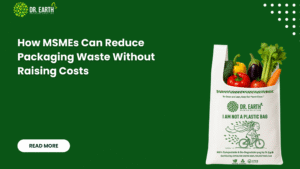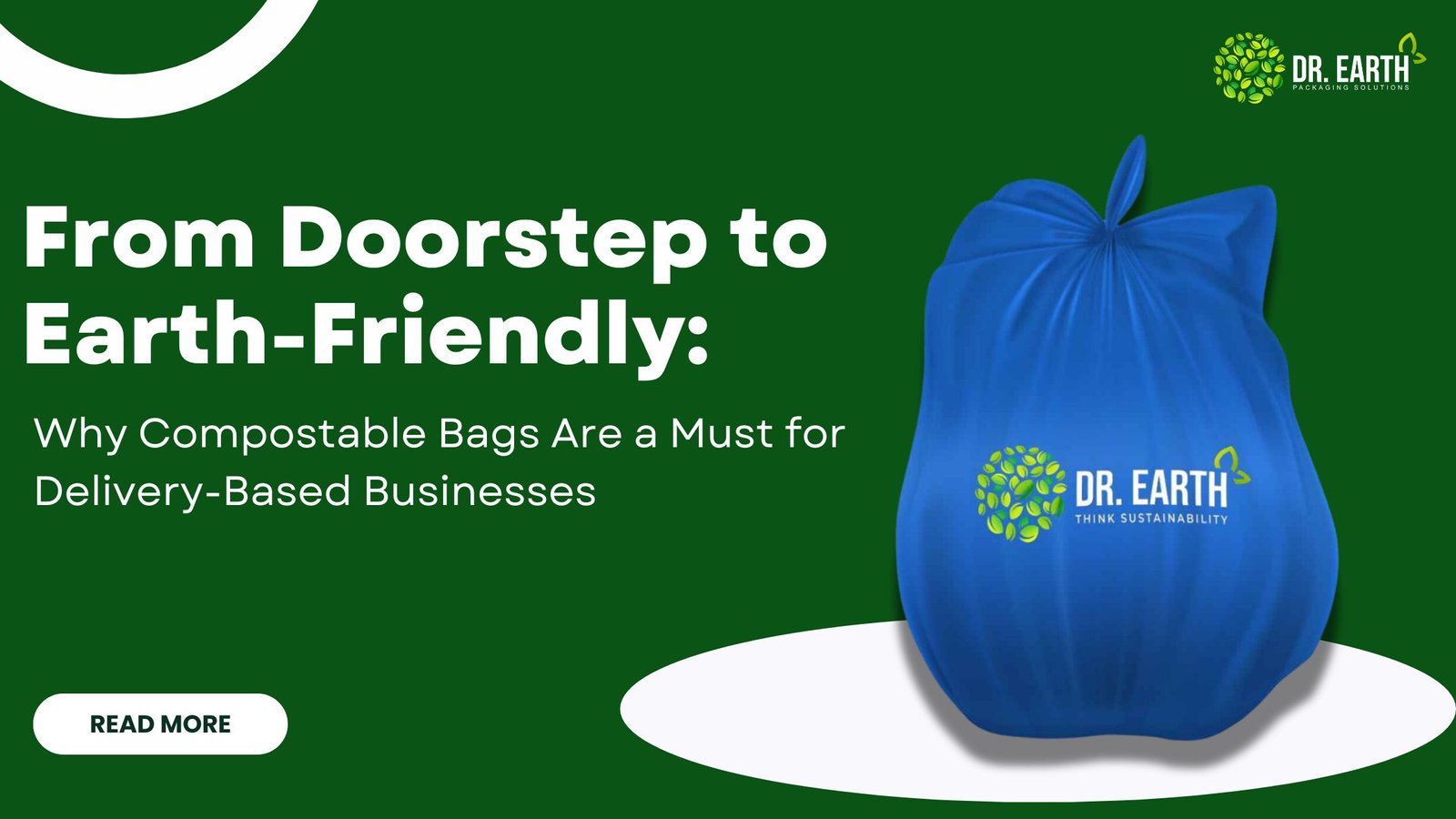
Doorstep delivery has become essential for our modern lifestyle. Grocery delivery, meal delivery, medicine delivery, and delivery of everyday essentials have continued to grow within the delivery-based business in India in the last ten years. However, this convenience has grown in step with one of the biggest environmental problems we face: plastic packaging waste.
In a single day, thousands of delivery-based businesses use millions of plastic bags, which, for the most part, will be discarded in landfills, water bodies, or on the street. While this method of commerce continues to grow dramatically and offers convenience to customers that cannot be matched, it also carries an environmental cost. Luckily, there is a developing solution: compostable bags.
Here, we will discuss the importance of compostable packaging in the delivery ecosystem, the benefits of compostable packaging, and how delivery-based businesses can successfully and profitably transition.
The Rise of Delivery-Based Businesses and Their Environmental Footprint
From food delivery platforms to D2C to hyperlocal delivery apps, the sheer volume of home delivery services in markets in urban India is staggering. Success has been dimensionally accompanied by huge rises in single-use consumables, and especially plastic carry bags and wrappers.
Did you know?
- India consumes over 16.5 million tonnes of plastic every year and a large portion of it is spent on packaging.
- Most of this plastic comes from delivery-based sectors: single-use bags, cutlery, trays, wraps, and tapes.
- Only 60% of plastic waste is collected in India and an even lower fraction is recycled.
For business models that are reliant on home delivery, correctly choosing your type of packaging is no longer simply a logistical decision—it is a strategic obligation.
Why Compostable Bags Are the Smarter Alternative
Compostable bags are manufactured using renewable plant-based resources such as cornstarch, PLA (polylactic acid), and PBAT. Where plastic bags can take hundreds of years to degrade, in a composting environment, compostable bags degrade into carbon dioxide, water, and biomass within 90 to 180 days.
Here’s why they’re an ideal choice for delivery-based businesses:
1. Eco-Friendly and Zero Waste
Compostable bags completely decompose without toxic residues and microplastics, through the composting process they can return to the earth as nutrients – relieving pressure on landfill sites and reducing ocean pollution.
2. Compliant with Regulations
Many states in India have already banned certain plastics, and the bans are expanding. While some have been relatively vague in the wording around the ban, it is clear that there is no room for compromise. However compostable bags (not all compostable bags), specifically ISO 17088 certified bags, have gone under a CPCB (Central Pollution Control Board) norm and therefore are compliant.
3. Safe for Food and Groceries
These bags are food-grade safe and are used for packaging perishable items such as vegetables, fruits, tiffins, dairy, and baked goods.
4. Enhance Brand Image
Today’s shoppers are more educated on the environment than ever. Brands using sustainable packaging build confidence and loyalty and rewarded with greater social media awareness
5. Reduce Carbon Footprint
Compostable packaging having plant based material has a lower carbon footprint than traditional plastic packaging from fossil sources.
Delivery Sectors That Can Benefit from Compostable Bags
1. Grocery Delivery Services
No matter if it’s produce or foods you need every day, compostable bags are a very realistic alternative to plastic bags for grains, vegetables and even some packaged food.
2. Tiffin & Meal Services
Local home cooks, cloud kitchens and meal subscription businesses can package and deliver their food unharmed in compostable bags & liners.
3. E-commerce Retailers
D2C and e-commerce companies sending delivery of non-fragile goods like clothing, books and other accessories can use compostable courier bags.
4. Pharmacies & Medical Deliveries
The medical deliveries industry can send hygienic and eco-safe deliveries no matter how small the items are e.g. tablets or sanitary items, utilizing compostable packaging.
5. Home Cleaning Product Startups
Brands selling natural or refillable cleaning products can reinforce their environment friendly intention by using compostable packaging.
What Makes a Bag Truly Compostable?
Not every bag they sell that claims to be “green” is truly sustainable. There are plastic bags that are sold as biodegradable that are actually oxo-biodegradable, which turn to micro plastic.
To be truly compostable, a bag should:
- Made from natural, plant-based materials (eg. cornstarch, PLA, PBAT)
- Decomposes in 6 months in industrial composting
- Decomposes without leaving any toxic residues or microplastics behind
- Certified under ISO 17088 (India) or ASTM D6400 (USA)
- Approved by the CPCB in India
It’s always a good idea to verify the certification symbols and documentation when possible when sourcing.
How Switching to Compostable Bags Can Boost Business
Sustainability is no longer a niche market but a mainstream expectation.
1. Customer Loyalty
Research shows that consumers will often pay more for sustainable products. When you choose compostable bags, you will become more attractive to this consciously minded consumer.
2. Competitive Differentiation
In a crowded market, sustainability platform is the only true differentiator. When our product, packaging (even in a compostable bag), tells your brand while not using words.
3. Social Media and PR Opportunities
Brands that go green will get increased traction on Instagram, LinkedIn or other media. A simple #SustainablePackaging hashtag can go a long way.
4. Partnership Opportunities
Many eco-conscious retailers and delivery platforms now prefer partnerships with green vendors. When you go for compostable packaging, it opens more doors.
5. Long-Term Cost Efficiency
When you add up all the savings and increase business growth, the switch in a compostable bag will yield long-term cost savings.
Common Myths About Compostable Delivery Bags
“They’re too expensive.”
While they can have higher unit costs, getting bags in bulk and good relationships with suppliers can help you save costs in the long run.
“They’re not durable.”
Certified compostable bags are made for real-world scenarios! They are moisture resistant, robust, and don’t tear.
“Customers don’t care.”
Today’s buyers are actively supporting businesses that are sustainable. Green packaging is a selling factor, not ‘nice to have.’
“Storage is complicated.”
Store in a cool, dry environment! Most compostable bags will be best used in a period of 6-9 months.
Introducing Dr. Earth Compostable Bags for Delivery Businesses
As pioneers of India’s sustainability movement, Dr. Earth is a supplier of certified compostable packaging solutions, for delivery-based businesses.
Why Choose Dr. Earth?
- ISO 17088 Certified and CPCB Approved
- manufactured from cornstarch and other plant based materials
- strong, durable and leak-proof,
- safe for food and non-food
- range of sizes available and custom printing or embossing possible for branding
Dr. Earth compostable bags will ensure your grocery delivery service, cloud kitchen or D2C product delivery will be safe, reliable and sustainable.
As manufacturing specialists with zero-waste policies, Dr. Earth is a solution partner for any progressive corporation.
Visit https://drearth.co.in to explore the product range or request samples.
How to Transition Your Business to Compostable Packaging
Step 1: Audit Your Packaging Needs
- What types of bags do you use?
- What volume per day/week/month?
2: Find a Certified Supplier
- Be sure to choose suppliers that provide ISO 17088 certified bags.
- Be sure to request samples and compliance documentation.
3: Rebrand the Switch
- Let customers know in website banners, packaging inserts or delivery agent logos they are using sustainable packaging.
4: Train Staff
- Be sure to educate your delivery staff, packers and logistics partners on compostable bag use and storage.
5: Track & Improve
- Get feedback from customers
- Keep track, review performance metrics like waste reduction, customer sentiment, and social media mentions.
A Case Example
A home-cooked tiffin delivery business operating in Pune switched to compostable bags about six months ago. Although they were initially reluctant due to expense, they have since:
- Received 30% repeat orders
- Been tagged in social media daily, 90% of the time doing deliveries
- Connected with local composting units
- Been mentioned on more and more green living blogs and news sites.
The increase in cost was absorbed by increased visibility of their brand, loyalty of their customers to their brand, and increased visibility of the local composting units’ services, all of which were visible within two months.
Looking Ahead: The Green Future of Deliveries
India’s drive for sustainability is unquestionably picking up speed. Now with climate issues lingering, plastic bans looming, and eco-awareness rising across the Indian citizenry, delivery based businesses have a meaningful part to play.
Compostable packaging is ethical and good business.
- It reduces your carbon footprint
- Improves customer experience
- Future-proofs your operations
Today, people are making decisions with their conscience as much as their pockets, and if your brand wants to send consumers the right message, then use compostable bags for your deliveries.
Final Thoughts
Your business provides convenience, comfort, and speed. Why not also provide consciousness?
Switching to compostable bags is more than compliance or image. It’s a promise to your customers, your community, and the environment. A promise that every delivery leaves nothing but goodwill in its wake.
It’s time for delivery-based businesses to shift from doorstep to earth-friendly impact.
Make the switch. One compostable bag at a time.
FAQs
Q-1. Are compostable bags suitable for food delivery?
Ans-Yes, certified compostable bags can come into direct contact with food and are ideal for tiffins, grocery items, and baked goods.
Q-2. Do compostable bags have a smell or texture?
Ans- No. A good-quality compostable bag will have no smell and will feel smooth and durable to the touch, just like plastic.
Q-3. Can customers reuse these bags?
Ans- Yes. Many compostable bags can be used several times before being discarded.
Q-4. What is the shelf life of compostable bags?
Ans- If kept in dry and cool conditions, they have a shelf life of 6-9 months without degrading.
Q-5. Can I print my brand name on compostable delivery bags?
Ans- Yes. Most certified suppliers will offer custom eco-friendly delivery options with branding and messaging.
Share:
Related Posts
